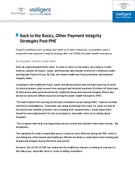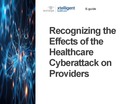Capturing Value from Patient-Centered Care
By: IBM View more from IBM >>
Download this next:
Back to the Basics, Other Payment Integrity Strategies Post-PHE
By: XtelligentMedia Healthcare
Type: eGuide
Fraud in healthcare isn’t as black and white as in other industries, so providers need a comprehensive payment integrity strategy after the COVID-19 public health emergency.
The back-to-the-basics approach is fitting after the expiration of the PHE, especially considering hospitals and physicians have both seemed to develop workflows and manage capacity better than they did early on during the pandemic.
Download the article to continue reading.
These are also closely related to: "Capturing Value from Patient-Centered Care"
-
Secure texting: The next great healthcare communications frontier
By: AVST
Type: eGuide
The lack of secure texting and communications is a primary factor in healthcare data risk. It is also a quick way for a hospital or healthcare organization to find itself in violation of HIPAA compliance, with swift and costly implications.
In this expert e-guide, learn why the first step to secure communications technology (like texting) is convincing leaders and clinicians to recognize the risks to health data.
-
Recognizing the Effects of the Healthcare Cyberattack on Providers
By: XtelligentMedia Healthcare
Type: eGuide
Change Healthcare suffered a cyberattack on February 21st at the hands of the notorious BlackCat/ALPHV ransomware group, forcing it to take its systems offline.
As the sector enters the second week of outages, operational disruptions and cash flow problems persist, with no timeline for when Change Healthcare, which is part of Optum and owned by UnitedHealth Group, will bring its systems back online.
For providers, that has meant delays in processing claims for payment, which represents a key revenue source for hospitals and independent practices alike. Patients have also felt the effects of this attack, as cost estimation services remain unavailable and some patients are unable to get their prescriptions or have to self-pay for medication
Find more content like what you just read:
-
The patient experience (PX) revolution in healthcare
By: TalkDesk
Type: White Paper
Influenced by their consumer interactions, patients now expect easy, seamless, and personalized healthcare experiences.Gain insights from our major global research survey that show how healthcare providers are rethinking and repositioning contact centers in support of a reimagined PX.
-
Which Health Plans Can Be Accessed by Individuals with Disabilities?
By: XtelligentMedia Healthcare
Type: eGuide
Medicare and Medicaid are common health plan options for people with disabilities, though they must meet certain criteria before becoming eligible for coverage.
-
Top Health IT Analytics Forecasts and Goals for the Coming Year
By: XtelligentMedia Healthcare
Type: eGuide
Health IT analytics and artificial intelligence experts say that healthcare organizations should focus on AI governance, transparency, and collaboration in 2024.
-
Top IT challenges for healthcare organizations in rural areas
By: XtelligentMedia Healthcare
Type: eGuide
Rural healthcare providers have long faced challenges surrounding their geographical isolation and limited financial resources. However, the digital health transformation has ushered in a new set of rural health IT challenges.
-
The journey to digital healthcare
By: TechTarget ComputerWeekly.com
Type: eGuide
In this e-guide we look at how the NHS shared care records projects are progressing, and the European Commission's plans to share health data across borders. We also look at how one NHS trust has created a social media platform to help mental health service users, and examine Scotland's digital health and care strategy.
-
Pharmacometabolomic data application for customized medicine
By: XtelligentMedia Healthcare
Type: eGuide
Pharmacometabolomics can provide additional context for personalized medicine by offering insights beyond genetic data.
-
How edge computing is shaping modern healthcare
By: Schneider Electric
Type: Research Content
As IT leaders in healthcare grapple with these difficulties, using emerging technologies like edge computing can make sure that healthcare organizations and the broader healthcare industry are ready for the future. Access this study to gain a deeper understanding of how edge computing is shaping modern healthcare.
-
Trust Emerges as Cybersecurity Issue for 42% of Security Decision-Makers
By: XtelligentMedia Healthcare
Type: eGuide
With cyberattacks on the rise, trust in teams and technology is crucial. However, 42% of security leaders see a trust deficit as their biggest hurdle, a new survey showed. Some trust is also misplaced, with 66% of security leaders trusting employees to prevent cyberattacks more than their own teams. Download the article to read more.
-
Healthcare Organizations: Actionable Cybersecurity Insights
By: Trustwave
Type: Research Content
In 2022, over 28.5 million healthcare records were breached, according to The U.S. Department of Health and Human Services. So, how can today’s healthcare organizations protect their records and defend against advanced threats? To unlock actionable insights, dig into this 46-page report.
-
The state of the healthcare consumer experience today
By: The Advisory Board
Type: Research Content
Healthcare consumers weigh several priorities, including access, convenience, cost, quality, and experience, when deciding where — or if — to seek care. As care providers compete on these priorities, view this report for a snapshot of the status quo from which they'll need to differentiate themselves.
-
Improving payer-provider collaboration in healthcare with AI
By: XSOLIS
Type: White Paper
Due to a dependence on legacy technology, many clinical teams have been forced to perform more unnecessary administrative tasks and spend less time on clinical interventions. Read on to discover how fully leveraging AI can improve understanding and communication between payers and providers and drive more efficient health outcomes.
-
How AI in utilization management enables better care
By: XSOLIS
Type: White Paper
Download this white paper to understand the pitfalls of traditional utilization management and review (UM/UR) strategies in healthcare and explore the potential of a purpose-built tool that leverages AI and ML to remove subjectivity in the UM/UR process, leading to improved outcomes for payers, providers, and patients.


